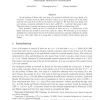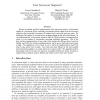308 search results - page 23 / 62 » Tight Lower Bounds for the Distinct Elements Problem |
TVLSI
1998
14 years 11 months ago
1998
— Excessive instantaneous power consumption may reduce the reliability and performance of VLSI chips. Hence, to synthesize circuits with high reliability, it is imperative to ef�...
125
click to vote
ASIAN
2004
Springer
15 years 5 months ago
2004
Springer
Abstract. This text is an informal review of several randomized algorithms that have appeared over the past two decades and have proved instrumental in extracting efficiently quant...
CORR
2010
Springer
14 years 9 months ago
2010
Springer
An old problem of Moser asks: how large of a union-free subfamily does every family of m sets have? A family of sets is called union-free if there are no three distinct sets in th...
203
click to vote
STOC
2012
ACM
13 years 2 months ago
2012
ACM
In this paper we develop a new technique for proving lower bounds on the update time and query time of dynamic data structures in the cell probe model. With this technique, we pro...
WDAG
1994
Springer
15 years 3 months ago
1994
Springer
We give an optimal, wait-free implementation of an increment register. An increment register is a concurrent object consisting of an integer-valued register with an increment oper...


